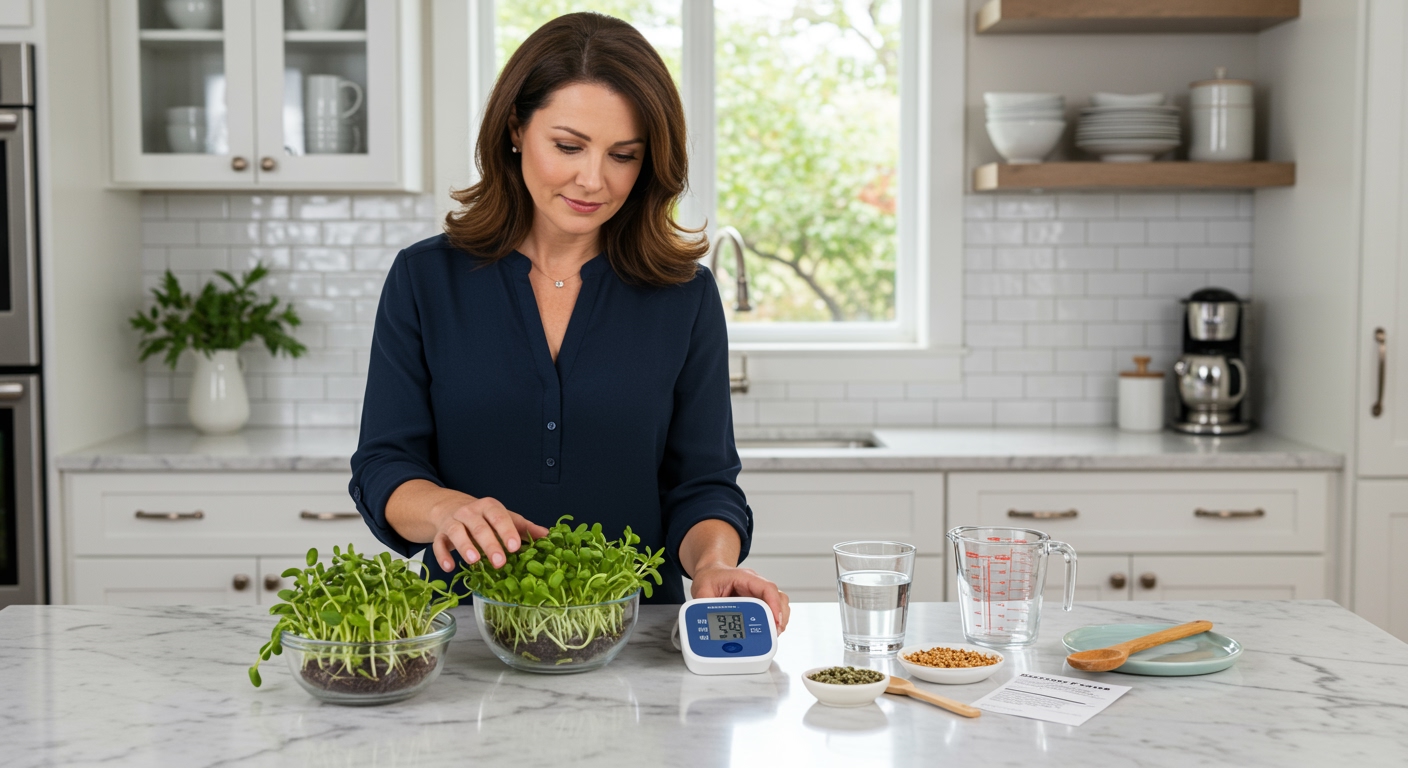✪ Key Takeaway: Sunflower sprouts do not significantly worsen low blood pressure in most people when eaten in normal amounts.
Introduction
Your blood pressure readings keep dropping lower than you want them to be.
You love adding sunflower sprouts to your salads and sandwiches, but now you wonder if these tiny green powerhouses might be pushing your numbers even lower into dangerous territory.
Hi, I’m Abdur, your nutrition coach and today I’m going to explain whether sunflower sprouts can worsen your low blood pressure condition and what you need to know to make informed decisions about including them in your diet.
What Makes Sunflower Sprouts Different From Other Foods?
Sunflower sprouts pack an impressive nutritional punch that sets them apart from many other vegetables and greens.
These young shoots contain high levels of potassium, magnesium, and vitamin E, along with plant compounds called phytosterols that support cardiovascular health.
The potassium content in sunflower sprouts is particularly noteworthy because this mineral plays a crucial role in blood pressure regulation.
Potassium works by helping your kidneys remove excess sodium from your body through urine, which can lead to blood vessel relaxation and potentially lower blood pressure readings.
However, the amount of potassium in a typical serving of sunflower sprouts is relatively modest compared to foods like bananas, potatoes, or spinach.
One cup of sunflower sprouts contains approximately 200-300 milligrams of potassium, which represents about 6-8% of your daily recommended intake.
✪ Fact: Sunflower sprouts contain more vitamin E per serving than most other sprouts and microgreens.
How Does Low Blood Pressure Actually Work In Your Body?
Low blood pressure, medically known as hypotension, occurs when your blood pressure readings consistently fall below 90/60 mmHg.
Your blood pressure depends on several factors working together: your heart rate, the amount of blood your heart pumps with each beat, and the resistance in your blood vessels.
When blood pressure drops too low, your organs may not receive adequate blood flow to function properly, leading to symptoms like dizziness, fatigue, and fainting.
The autonomic nervous system normally helps maintain blood pressure by adjusting heart rate and blood vessel diameter in response to changes in body position, activity level, and other factors.
Some people have naturally low blood pressure without any symptoms or health problems, while others develop hypotension due to medications, dehydration, heart conditions, or nutritional deficiencies.
Understanding your individual pattern of blood pressure readings helps determine whether dietary changes might influence your numbers significantly.
✪ Pro Tip: Track your blood pressure at the same time each day for more accurate pattern recognition.
Can Sunflower Sprouts Actually Lower Your Blood Pressure?
The research on sunflower sprouts and blood pressure shows a complex relationship that depends on multiple factors.
While sunflower sprouts contain nutrients that can theoretically influence blood pressure, the actual impact on your readings depends on how much you eat, your overall diet, and your individual health status.
The potassium content in sunflower sprouts could contribute to blood pressure reduction, but only if you consume large quantities regularly as part of a high-potassium diet.
Most people eat sunflower sprouts in small amounts as garnishes or additions to salads, which means the blood pressure impact would be minimal.
Studies on microgreens and sprouts generally focus on their antioxidant properties and vitamin content rather than specific effects on blood pressure regulation.
The magnesium in sunflower sprouts might also play a role in blood vessel function, but again, the amounts consumed in typical servings are unlikely to cause dramatic changes in blood pressure readings.
If you have severely low blood pressure that causes symptoms, the small amount of potassium and magnesium in sunflower sprouts is not likely to be the primary factor affecting your condition.
✪ Note: Individual responses to foods can vary significantly based on genetics and health conditions.
What Should You Do If You Have Low Blood Pressure?
Managing low blood pressure requires a comprehensive approach that goes beyond worrying about individual foods like sunflower sprouts.
Focus on staying adequately hydrated by drinking enough water throughout the day, as dehydration can worsen hypotension symptoms.
Include adequate amounts of sodium in your diet, as people with low blood pressure often benefit from slightly higher sodium intake compared to those with high blood pressure.
Eat regular, balanced meals to maintain stable blood sugar levels, which helps support consistent blood pressure readings throughout the day.
Consider wearing compression stockings if your doctor recommends them, as these can help improve blood flow from your legs back to your heart.
Monitor your response to different foods and activities by keeping a simple log of your blood pressure readings along with notes about what you ate and how you felt.
You can continue enjoying sunflower sprouts as part of a varied diet unless you notice a clear pattern of worsening symptoms after eating them, which would be unusual for most people.
✪ Pro Tip: Stand up slowly from sitting or lying positions to minimize dizziness from blood pressure changes.
The Bottom Line
Sunflower sprouts are unlikely to significantly worsen your low blood pressure when consumed in normal dietary amounts.
The key to managing hypotension lies in your overall lifestyle patterns, not in avoiding specific healthy foods, and focusing on hydration, regular meals, and appropriate sodium intake will have much more impact on your blood pressure than eliminating nutritious sprouts from your diet.
I would love to hear about your experiences with low blood pressure and how different foods affect your symptoms, so please share your thoughts and questions in the comments section below.
References
At NutritionCrown, we use quality and credible sources to ensure our content is accurate and trustworthy. Below are the sources referenced in creating this article:
- Healthline: Sunflower Seeds: Nutrition, Health Benefits and How to Eat Them
- Holland & Barrett: Sunflower Seeds Benefits
- Lose It: The Nutrition in Sunflower Sprouts
- Healthier Steps: Benefits of Sunflower Sprouts





